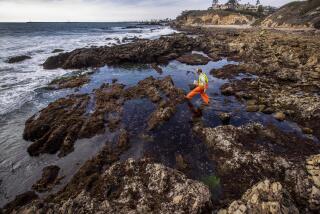Senate OKs Funding for Pipeline Safety
- Share via
WASHINGTON — The Senate unanimously passed a bill Thursday calling for increased federal funding of pipeline safety efforts, responding to several deadly accidents involving pipeline explosions in the last two years.
The Pipeline Safety Improvement Act would allot $26 million to fund pipeline safety and earmark $17 million more for grants to states to help with pipeline safety measures in the 2002 fiscal year.
“We simply must take action now,” said Sen. John McCain (R-Ariz.), sponsor of the bill, who cited two recent tragic accidents in urging swift action on the legislation. Among them, 12 members of two families camping in New Mexico were killed last year when a 50-year-old natural gas pipeline exploded. And in 1999, three youths died in Washington state when gasoline leaking from a pipeline built in 1966 ignited a creek.
Since 1986, there have been 5,700 oil pipeline accidents involving 325 deaths and 1,500 injuries, lawmakers said.
In the House, a similar measure failed last year to win approval. But advocates are more optimistic about prospects for the revised version, which already has been introduced in the lower chamber.
“This year it is improved; it is the strongest legislation yet,” said Sen. Patty Murray (D-Wash.). “The House must now step up.”
The legislation approved by the Senate would require operators of natural gas transmission pipelines to submit plans outlining specific measures to reduce accidents, such as replacing or repairing aging or broken lines.
The bill also would require that pipelines be inspected by the Department of Transportation’s inspector general every five years. The inspector would have the authority to order operational changes after such evaluations to reduce the risk of accidents.
“We need to perform better physical inspections to ensure pipelines are safe,” said Sen. John B. Breaux (D-La.). “We need a major improvement on the current system.”
The measure also would provide for additional education and training of pipeline operators, including ensuring that employees are adequately trained to respond to explosions and other emergencies.
The need for improved pipeline safety is all the more urgent because of the rate at which fatal pipeline accidents have been occurring, McCain said. On average, there is one pipeline accident a day in the United States, according to a report cited by Murray.
“Because the Congress did not act [sooner], an unacceptable status quo under which a total of 38 fatalities occurred during just the last year remains the law of the land,” McCain said. “This is a call for action.”
Lawmakers said the problem of aging and broken pipelines affects every state. “We want to use the best technology that is available to ensure the safety of all pipelines,” Breaux said.
Murray said that many pipelines are 30 or 40 years old, are susceptible to internal corrosion and other damage and are not inspected regularly.
More to Read
Sign up for Essential California
The most important California stories and recommendations in your inbox every morning.
You may occasionally receive promotional content from the Los Angeles Times.













